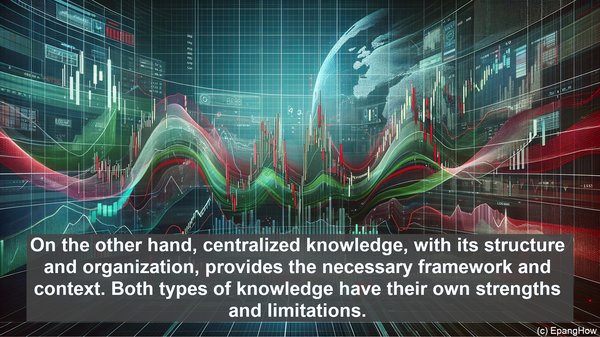Introduction: The Role of Knowledge in Economics
Hello everyone! Welcome to our article on dispersed knowledge and centralized knowledge in economics. Before we dive into the differences, let’s first understand the significance of knowledge in the realm of economics. Knowledge, in economics, is not just limited to theoretical concepts and models. It encompasses a wide range of information, including market trends, consumer behavior, technological advancements, and much more. This knowledge forms the foundation on which economic policies are built and decisions are made. Now, let’s move on to the two types of knowledge: dispersed and centralized.

Dispersed Knowledge: The Power of Collective Wisdom
Dispersed knowledge, as the name suggests, is knowledge that is spread across various individuals, firms, and even regions. It is the collective wisdom of countless actors in the economy. One of the key aspects of dispersed knowledge is its tacit nature. It is often difficult to articulate or codify this knowledge into explicit forms. For example, a local farmer may have years of experience and knowledge about the best time to plant crops, but this knowledge may not be easily transferable or documented. Dispersed knowledge is also dynamic, constantly evolving with changing circumstances. This dynamic nature allows for adaptability and innovation, as different actors can respond to local conditions in real-time.
Centralized Knowledge: The Role of Institutions
In contrast to dispersed knowledge, centralized knowledge is more structured and organized. It often resides within institutions such as government agencies, research organizations, or central banks. Centralized knowledge is often explicit, meaning it can be easily documented, shared, and analyzed. This knowledge is crucial for policy-making, as it provides a comprehensive and systematic understanding of the economy. For instance, a central bank’s knowledge about inflation trends, interest rates, and monetary policies is vital in formulating effective strategies. Centralized knowledge also plays a role in standardization and regulation, ensuring consistency and fairness in economic activities.
The Interaction: How Dispersed and Centralized Knowledge Complement Each Other
While dispersed and centralized knowledge may seem distinct, they are not mutually exclusive. In fact, they often interact and complement each other. The decentralized nature of dispersed knowledge allows for localized decision-making, taking into account specific conditions and contexts. However, this localized knowledge needs to be synthesized and integrated, which is where centralized knowledge comes into play. Centralized knowledge provides the broader framework and context, ensuring that localized decisions align with the overall objectives and goals. This interaction between dispersed and centralized knowledge is crucial for a well-functioning economy.

